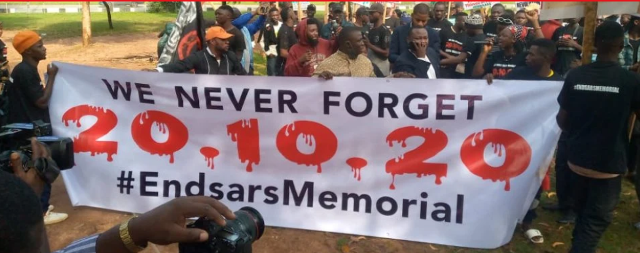Owei Lakemfa
The ongoing political awakening of the Nigerian youth can be likened to a miniature copy of the famous Arab Spring. By 2010, stagnation, corruption and the oppression of the people by most governments in the Arab world had led to an atmosphere of despair and hopelessness.
The social time-bomb exploded in Tunisia in December 2010 when government officials, in their usual impunity, pounced on a street vendor, 26-year-old Mohammed Bouazizi, and confiscated his goods. Bouazizi poured petrol on himself and struck a match. That act of self-immolation became the root of the “Jasmine Revolution” protests which shook the Middle East as “the Arab Spring” till 2013.
It led to changes of government in Tunisia and Algeria. It brought down the dictatorship of Egypt’s Hosni Mubarak and resulted in the murder of an African legend, Colonel Muamar Gaddafi of Libya. Till today, the Libyan Jamahiriya, once an African paradise on earth, remains a failed country. America’s evil ex-president, Barack Obama, can thank himself for destroying Gaddafi and Libya and vicariously transforming a rag-tag Boko Haram in the Nigerian Lake Chad region into the world’s most nihilist Islamic terrorist group.
Here in Nigeria, something similar but in a much more muted dimension is on. Decades of corrupt, incompetent and selfish governance weaponised poverty among the Nigerian hoi polloi. Massive unemployment and graduate unemployability impoverished the Nigerian youth. Few Nigerian young men are in a position to propose marriage to our young women. Large numbers of young women are getting old without getting married and settling down in their own homes as expected of them. The ruling class has stolen their joy and future.
The youth reacted in several ways. Some became the foot soldiers of the corrupt politicians; rigging elections for them, acting as their e-rats, becoming cultists, robbers, kidnappers, ritualists or prostitutes; taking up cyber crimes, fleeing abroad to hustle, becoming musicians or comedians, burying their heads in Big Brother Naija and generally floating around like logs at sea.
Then, the series of sporadic #EndSARS protests started in response to police brutality, extortion, extra-judicial murders, summary detentions and general harassment of the youth and ordinary citizens. In October 2020, the #EndSARS protests took on a new dimension. Youth, mostly in their twenties and thirties, gathered in many cities to protest against the latest waves of police brutalities. They shouted “EndSARS”, but underpinned in their agitation was a demand for better governance.
The main venue of the #EndSARS protest was at Lekki Tollgate in Lagos. Hundreds of youths from across the ethno-religious divides gathered everyday, sang patriotic songs, made inspiring speeches and displayed messages calling for a better Nigeria. They spoke out loud (Soro S’oke) firmly but politely.
After about 10 days or so of these continuous gatherings, government and its relevant agencies lost their patience. They deployed armed thugs to disperse the protesters since the police could not accomplish that task. Hoodlums chased after protesters in Abuja with dangerous weapons. When the thugs failed, the military was drafted to carry out the night-time Lekki Tollgate massacre of unarmed youths while they sang patriotic songs.
It was at this point that the hoodlums took over, destroying police stations and killing policemen. In Lagos, apart from targeting the police, the hoodlums also descended on properties of the Lagos State Government and went after prominent politicians and traditional rulers known to be their supporters. After emptying out the COVID-19 warehouses, they also looted shops and devastated innocent people’s businesses.
When the dust settled on the mayhem, some evil doers in charge of Lagos politics made an attempt to blame the Igbo residents of the state and “IPOB” for the destruction that took place. The obvious intention was to spark off an ethnic war between the Yoruba and Igbo ethnic groups in Lagos and beyond. Fortunately, the Yoruba socio-cultural watchdog, Afenifere, and the Yoruba elements of the #EndSARS Movement debunked the lies. The devil passed.
At the beginning of the current race to 2023, the youth were simply not interested. They ignored the one year period that the Independent National Electoral Commission, INEC, gave for people to register. They even abandoned 20 million already registered PVCs in INEC offices. The APC and its elder brother, the Peoples Democratic Party, PDP, did not present any viable pathway to the future for the youth.
But the involvement of Peter Obi in the process, particularly his departure from the PDP to the Labour Party, became the touchstone for the Nigerian Youth Spring. Obi, one of the very best governors who have served this country from Anambra State, has captured the imagination of the youth across board, particularly the #EndSARS/Soro S’oke Movement who have now transformed into the Obidient Movement. They are pioneering a new political culture where party members contribute to politics in order to be able to force the leaders to perform in future.
Over the years, Obi has carefully articulated his understanding of the Nigerian situation and how to move it away from a consuming to producing nation leveraging on his intimate study of other successful systems. He is a darling of the media (especially the electronic and social media) which he exploits to endear him directly to the youth. Obi is the main reason the youth have regained their interest in Nigerian politics. That is why they are knocking at INEC’s door for PVC registration, and aren’t taking “no” for an answer. Rabiu Kwankwaso of the New Nigerian People’s Party, NNPP, is also turning the heads of the Northern youth.
Can the Nigerian Youth Spring force a change in 2023? Having taken the driving seat, will they stay the course till El Dorado?































































